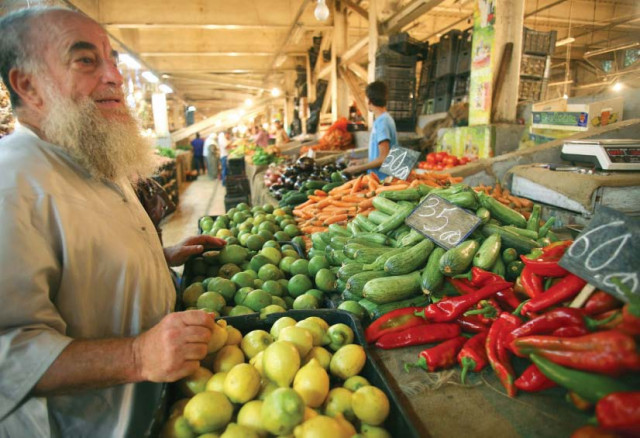Epic fail: ‘Factors fuelling food inflation beyond govt’s control'
Shortages and high grain rates in global market behind price rise: monitoring body.

Epic fail: ‘Factors fuelling food inflation beyond govt’s control'
A hapless government cannot save consumers from increasing food prices as the price monitoring committee said on Saturday that reasons behind rising food prices were beyond government’s control.
A maiden meeting of the National Price Monitoring Committee, held here under the chairmanship of Finance Secretary Dr Waqar Masood and attended by provincial representatives, reviewed price trends of essential items and measures to stabilise them during Ramazan.
An official handout states that ‘everything is under control’ except for in Balochistan where due to insurgency the outreach of facilitation centres is limited to Quetta. It said prices were increasing due to shortage of commodities and high grain prices in the world market – factors that cannot be controlled by government agencies.
The monitoring committee claimed that essential food items are cheaper in Pakistan than India and Bangladesh. “Prices of wheat, wheat flour, chicken (farm), onion and garlic are the lowest in Pakistan compared to other countries in the region like India and Bangladesh.”
According to the handout, “food inflation is being fuelled by a combination of global trends in commodity prices and supply and demand-driven factors largely beyond the control of national entities.”
The committee observed that food prices showed an increase during July before the start of Ramazan which appeared to be a seasonal impact. It expressed satisfaction over administrative measures taken by provincial governments to control prices during Ramazan.
The finance ministry said the Sensitive Price Index – a barometer to measure changes in prices of essential items mostly used by the lower and middle class, was soaring due to increase in prices of food items, which carry a 40 per cent weight in the index.
Moreover, it added, international commodity prices have risen steadily over the last one year led by an increase in prices of sugar which surged 61.6 per cent, wheat 55 per cent, crude oil 54 per cent, palm oil 34.8 per cent and soya bean oil 47.4 per cent.
A representative of the Punjab government told the meeting that 308 Ramazan bazaars have been established in Lahore, DG Khan, Bahawalpur, Sahiwal, Multan, Sargodha, Faisalabad, Gujranwala and Rawalpindi divisions. Arrangements have been made for regular supply of essential items.
The Sindh government has set up a supply and price department and revived the Bureau of Supply and Prices under its administrative control to monitor, evaluate, regulate and fix prices of essential commodities by ensuring their smooth supply.
It has also drafted different laws including the Sindh Essential Commodities, Price Control and Prevention of Profiteering and Hoarding Act 2010 and Sindh Consumer Protection Act 2011. These envisage a mechanism to keep prices at reasonable levels, by preventing profiteering and hoarding.
They also provide an opportunity to the people to raise their voice against substandard products and lack of services, in consumer councils and courts.
In Khyber-Pakhtunkhwa, special price magistrates have been activated under the Food Stuff Ordinance 1975 to effectively check and control prices of essential items and ensure prices remain in line with the displayed price list.
In Balochistan, special facilitation bazaars have been established in Quetta. However, owing to the insurgency, their outreach has been limited. It has been ensured that deputy commissioners, who are chairman of district price committees, are assisted by magistrates and police to implement the prices fixed by the government in respect of essential items and report timely to the commissioners.
Islamabad Capital Territory (ICT) administration is making efforts to control the increase in prices of beef, mutton, pulses, flour, bread, fruit and vegetables, said the finance ministry.
The federal government has approved a Rs2 billion package for providing subsidy on food items at utility stores during Ramazan.
Published in The Express Tribune, August 7th, 2011.



















COMMENTS
Comments are moderated and generally will be posted if they are on-topic and not abusive.
For more information, please see our Comments FAQ